Self-employed access to benefits eased due to coronavirus
 © Tim Scrivener
© Tim Scrivener Self-employed workers will have quicker and easier access to benefit support during the coronavirus pandemic.
As part of the government’s response to tackling the virus, chancellor Rishi Sunak announced people ineligible for statutory sick pay, such as the self-employed, will be able to claim Employment and Support Allowance (ESA) from day one of illness, rather than day eight.
ESA is paid to those who are too sick to work, provided they meet certain conditions. It is worth £73.10/week, or £57.90 for under-25s.
See also: Coronavirus: How employers can get help with statutory sick pay
The government is also temporarily removing the minimum income floor from universal credit.
The minimum income floor takes into account how much a worker would normally expect to earn in a month, when calculating entitlement to universal credit.
Not having the floor means being able to claim for time people spend off work due to sickness, which Rob Hitch, of Dodd and Co Accountants, called a helpful measure.
“It should be noted, however, that the government states the minimum floor will be suspended ‘for the duration of the outbreak’, so this is very much a temporary measure,” said Mr Hitch.
“Universal credit is a means-tested benefit, so if you hold non-business or personal home assets, such as premium bonds, ISAs or let property, these will bar you from a claim if they exceed £16,000, and at present this still applies.”
The chancellor also said instead of attending a job centre, applications could be made on the phone or online instead.
Farmers must review their responsibilities towards their farmworkers and ensure appropriate measures are put in place to protect them, said Mr Hitch.
“Farming is one of those industries that cannot operate remotely,” he said. “Staff availability, which is already an issue for many farms, may become even more of a problem in the coming weeks and months.”
Support for businesses paying tax
All businesses and self-employed people in financial distress, and with outstanding tax liabilities, may be eligible to receive support with their tax affairs through HMRC’s Time To Pay service.
These arrangements are agreed on a case-by-case basis and are tailored to individual circumstances and liabilities.
If you are concerned about being able to pay your tax due to Covid-19, call HMRC’s dedicated helpline on 0800 0159 559.
